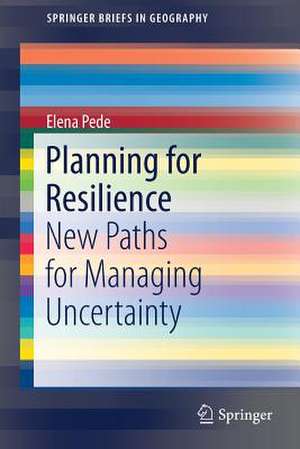Planning for Resilience: New Paths for Managing Uncertainty: SpringerBriefs in Geography
Autor Elena Pedeen Limba Engleză Paperback – 11 apr 2019
Din seria SpringerBriefs in Geography
-
 Preț: 349.97 lei
Preț: 349.97 lei -
 Preț: 377.18 lei
Preț: 377.18 lei -
 Preț: 380.63 lei
Preț: 380.63 lei -
 Preț: 381.98 lei
Preț: 381.98 lei -
 Preț: 379.09 lei
Preț: 379.09 lei -
 Preț: 380.25 lei
Preț: 380.25 lei -
 Preț: 381.98 lei
Preț: 381.98 lei -
 Preț: 411.32 lei
Preț: 411.32 lei -
 Preț: 314.59 lei
Preț: 314.59 lei -
 Preț: 340.12 lei
Preț: 340.12 lei -
 Preț: 376.22 lei
Preț: 376.22 lei - 15%
 Preț: 469.09 lei
Preț: 469.09 lei -
 Preț: 376.22 lei
Preț: 376.22 lei -
 Preț: 345.52 lei
Preț: 345.52 lei -
 Preț: 377.35 lei
Preț: 377.35 lei -
 Preț: 376.22 lei
Preț: 376.22 lei -
 Preț: 347.32 lei
Preț: 347.32 lei -
 Preț: 411.93 lei
Preț: 411.93 lei -
 Preț: 377.35 lei
Preț: 377.35 lei -
 Preț: 378.92 lei
Preț: 378.92 lei -
 Preț: 350.65 lei
Preț: 350.65 lei -
 Preț: 377.73 lei
Preț: 377.73 lei -
 Preț: 379.09 lei
Preț: 379.09 lei -
 Preț: 376.80 lei
Preț: 376.80 lei -
 Preț: 347.74 lei
Preț: 347.74 lei -
 Preț: 376.22 lei
Preț: 376.22 lei -
 Preț: 378.54 lei
Preț: 378.54 lei -
 Preț: 338.71 lei
Preț: 338.71 lei -
 Preț: 414.21 lei
Preț: 414.21 lei -
 Preț: 379.68 lei
Preț: 379.68 lei -
 Preț: 378.34 lei
Preț: 378.34 lei -
 Preț: 384.86 lei
Preț: 384.86 lei -
 Preț: 342.20 lei
Preț: 342.20 lei -
 Preț: 377.57 lei
Preț: 377.57 lei -
 Preț: 343.83 lei
Preț: 343.83 lei -
 Preț: 377.35 lei
Preț: 377.35 lei -
 Preț: 350.81 lei
Preț: 350.81 lei -
 Preț: 378.92 lei
Preț: 378.92 lei -
 Preț: 353.36 lei
Preț: 353.36 lei -
 Preț: 375.62 lei
Preț: 375.62 lei -
 Preț: 149.55 lei
Preț: 149.55 lei -
 Preț: 378.12 lei
Preț: 378.12 lei -
 Preț: 347.32 lei
Preț: 347.32 lei -
 Preț: 376.43 lei
Preț: 376.43 lei -
 Preț: 413.65 lei
Preț: 413.65 lei -
 Preț: 376.43 lei
Preț: 376.43 lei -
 Preț: 344.52 lei
Preț: 344.52 lei -
 Preț: 378.71 lei
Preț: 378.71 lei -
 Preț: 378.12 lei
Preț: 378.12 lei
Preț: 376.80 lei
Nou
Puncte Express: 565
Preț estimativ în valută:
72.10€ • 75.28$ • 59.54£
72.10€ • 75.28$ • 59.54£
Carte tipărită la comandă
Livrare economică 15-29 aprilie
Preluare comenzi: 021 569.72.76
Specificații
ISBN-13: 9783030172619
ISBN-10: 3030172619
Pagini: 79
Ilustrații: X, 88 p. 4 illus.
Dimensiuni: 155 x 235 mm
Greutate: 0.15 kg
Ediția:1st ed. 2020
Editura: Springer International Publishing
Colecția Springer
Seria SpringerBriefs in Geography
Locul publicării:Cham, Switzerland
ISBN-10: 3030172619
Pagini: 79
Ilustrații: X, 88 p. 4 illus.
Dimensiuni: 155 x 235 mm
Greutate: 0.15 kg
Ediția:1st ed. 2020
Editura: Springer International Publishing
Colecția Springer
Seria SpringerBriefs in Geography
Locul publicării:Cham, Switzerland
Cuprins
Chapter 1. The promise of security.- Chapter 2. Responding to disasters.- Chapter 3. The Region of Umbria as case study.- Chapter 4. Planning for resilience.- Reference.
Notă biografică
Elena Pede is Post-Doctoral Research Fellow at Interuniversity Department of Regional and Urban Studies and Planning, Politecnico and Università di Torino, Italy. Her main research interests focus on knowledge and learning in social-ecological system resilience and territorial governance. She took part in national and international research projects working on territorial development and planning for resilience (ESPON, INTERREG). Currently, her research activity is focused on climate change adaptation measures in planning tools and inner peripheries.
Caracteristici
Discusses a multidisciplinary framework focused on planning theory, sociological risk approach, and knowledge management Outlines the resilience concept that is applied to the entire PPRR (prevision-prevention-response-recovery) chain Offers an in-depth unpublished Italian case study on earthquakes and hydrogeological risks
